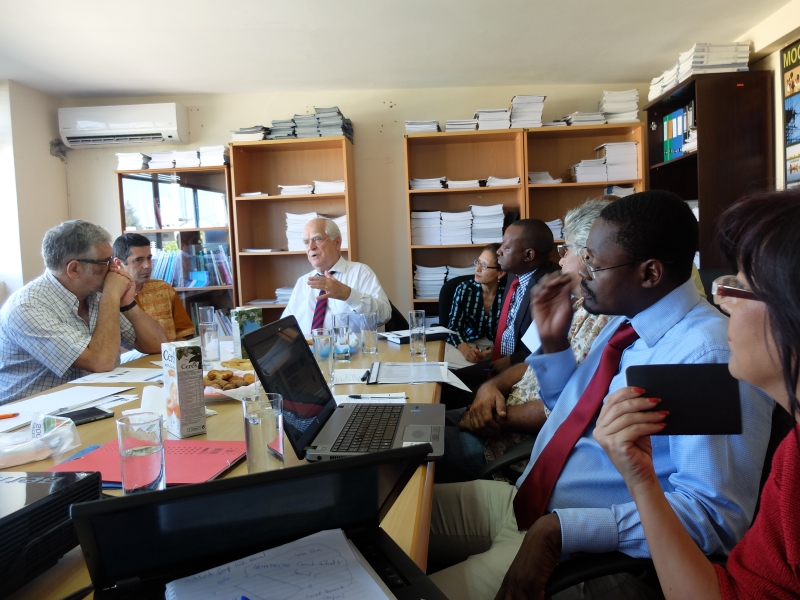The hope of Mozambique is in the sea, a senior official says

MAPUTO, 19 February 2016. Another day comes to an end in the Mozambican capital and fishermen reappear close to the shore to unload their catch of the day.

Despite the burning sun, women already wait on the beach to get their share of fish to sell at the Mercado do Peixe. In the artisanal fishers’ nets, shallow-water prawns are one of the biggest catches.
With 70% of the population living along the coast, the sea is a key source of employment, proteins and food security in the country and the fisheries sector represents a significant source of income for the economy.
Yet, over the last decades, overfishing and destructive fishing techniques have contributed to declining fish catches and degraded ecosystems in many nearshore areas. Despite the instauration of a 6-month closed season for shrimp fisheries in the early 2000s, shallow-water prawn stocks have kept on declining and fishers have been noticing a reduction in size of their catches.
Climate change is expected to worsen this issue, as the coasts are particularly vulnerable to cyclones, storm surges and flooding.
Illegal, Unreported and Unregulated (IUU) fishing is another significant threat to the country’s marine resources. Due to insufficient fisheries monitoring and governance capacities, the African country has been highly targeted by foreign long-distance fishing fleets fishing illegally in its waters. It is estimated that illegal fishing represents a $35 million loss for Mozambique each year.
During its 3-day visit to Mozambique, the FiTI Secretariat met with H.E. Henrique Bongece, Deputy Minister of the Sea, Inland Waters and Fisheries and two of his directors to discuss the status of Mozambique’s fisheries. As the country increasingly notices the signs of global warming, “the hope of the people is in the sea”, he said.
“The fisheries sector is very important to the country, it contributes to food security and brings foreign currency”, the Deputy-Minister explained. “All initiatives which allow us to better understand how our fisheries are doing are very welcome”, H.E. Henrique Bongece concluded.
During a 3-hour multi-stakeholder workshop hosted by the Centro de Integridade Publica (CIP), representatives of the three major stakeholder groups discussed with the FiTI Secretariat their views on the current status and challenges of fisheries in Mozambique. Amongst them were present actors from small scale-fisheries, large-scale fisheries, and civil society as well representatives from the Ministry of Sea, Inland Waters and Fisheries, Centro de Integridade Publica (CIP), OXFAM, World Wide Fund For Nature (WWF), ARMAPESCA , AMAPIC and SIP – Sociedade Industrial De Pesca.
In the light of the challenges of the fisheries sector in the country, all stakeholders agreed that enhancing fisheries governance is crucial to ensure that the population will continue to benefit sustainably from their country’s marine resources.
“Fish is less and less available to the local poor”, a representative from OXFAM explained. This poses serious challenges to the country, as 50% of the Mozambican population get their proteins from fish.
More transparency would significantly help ensuring that the fish caught alongside the coasts of the country is fished sustainably and that all the population receives benefits from it. “Prawns and tuna is our main fish. As a high-value fish, the major part is exported to generate revenue. But not only has most of our population never eaten tuna, they also do not profit from the benefits generated,” a representative from the opposition party (RENAMO) regretted.
One major recommendation from the meeting concerned the presentation of information to the public. It must be ensured that the information published raises awareness and empowers the population to verify that their country’s fisheries are managed in a responsible and sustainable way. This recommendation was based on lessons learned from the implementation of the Extractive Industries Transparency Initiative (EITI) in the country. “Currently, the press is covering EITI information in a disastrous way, only leading to more confusion”, one participant said.
The FiTI Secretariat also met with other fisheries experts to discuss the role of transparency and participation for responsible fisheries. Those experts, too, agreed that more transparency is highly needed in the country, especially regarding licenses, catches and quotas. They also emphasized that transparency efforts should also include small-scale fisheries in order to boost their relevance and importance to sustainable fisheries.
After international headlines revealed a significant case of corruption in the country’s fisheries sector – the EMATUM scandal, a nationally-owned fishing company –, fisheries transparency is now more than ever an important topic for Mozambique.
Data from Fishforever, February 2014. http://www.fishforever.org/wp-content/uploads/2014/02/FishForeverMozambique.pdf